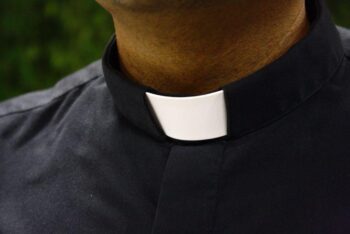Holy Orders

Our online book study of Rachel Held Evans' Searching for Sunday continues with a reflection from parishioner and associate clergy person, Borden Painter. For next week, read section four: Communion.
Each week, one new entry by someone connected to the St. James’s community will post to this blog on Wednesday morning covering one section of the book. Please enter your email address to the right to receive these posts in your email inbox. Use the comment section to answer the discussion questions, and share these posts with your friends!
+
In describing her own journey of faith Rachel Held Evans provides us with thoughtful and thought-provoking insights into what it means to be a Christian today. Her journey begins within the confines of a restrictive and exclusive form of fundamentalist evangelicalism and ends with discovering the Episcopal Church, but without giving up her evangelical roots and identity. She writes with great verve, energy and purpose that kept my attention all the way.
Her use of the sacraments to organize the sections of the book deftly interjects her fresh perspectives on Christian faith within a traditional framework. As one who has always been an Episcopalian, I liked the way she pulled me into an appreciation of the breadth and depth of Christian witness today.
 Her approach is well illustrated in the section on “Holy Orders” that begins not with traditional “Episcopal-speak” about the Apostolic Succession linking us with the earliest church, but with the use of hands to express and pass on our faith in blessing, healing, baptizing, celebrating communion, and in reaching out to the “immigrant, the refugee, the lonely, or the sick.” (98)
Her approach is well illustrated in the section on “Holy Orders” that begins not with traditional “Episcopal-speak” about the Apostolic Succession linking us with the earliest church, but with the use of hands to express and pass on our faith in blessing, healing, baptizing, celebrating communion, and in reaching out to the “immigrant, the refugee, the lonely, or the sick.” (98)
Her description of the birth, life and demise of the “Mission” (99-109) vividly depicts the challenge of forming a Christian community that is “authentic, intentional, and missional.” (101) While the effort failed in the sense that the community could not sustain itself, it was less a failure and more another step in her journey toward an authentic Christianity. Authenticity has to do with sticking to the origins, purposes and defining character of whatever it is we are pursuing. The quest for authentic Christianity has led to all sorts of divisions, conflicts and disagreements since the earliest days that is, I think, the price of pursuing what we deem the “real thing.”
It has been said that “nothing fails like success.” Hence the danger to authentic Christianity when any form of the Church seeks and achieves “success” in the eyes of the world. The author’s pages on the Walnut Bar and the “EPIC FAIL Pastors Conference” reminded us that “Christians may need to get used to the idea of measuring significance by something other than money, fame, and power.”
Her final section on “Feet” (114-117) notes the tension that has always existed between our belief in “the priesthood of all believers” and the calling of some Christians to the ordained ministry. She turns to Orthodox theologian Alexander Schmemann who reminds us that the role of the priestly vocation is to reveal to each vocation its priestly essence so that all of us in the church may share the same calling to be a “royal priesthood” to “show others the goodness of God, for he called you out of the darkness into his wonderful light.” (I Peter 2:9)
Question For Discussion
How can we be authentically Christian in today’s world?”
